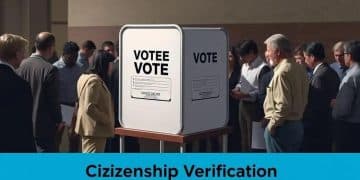Polls reveal shifting public opinion against Trump’s policy proposals

Anúncios
Polls reveal shifting public opinion against Trump’s policy proposals as voters prioritize economic stability, healthcare access, and transparency, prompting candidates to adapt their strategies to align with these emerging concerns.
Polls reveal shifting public opinion against Trump’s policy proposals, sparking discussions on how these changes might influence future elections. Have you noticed the changing landscape of political opinions?
Anúncios
Overview of recent polls on Trump’s policies
Recent polling data sheds light on how the public views Trump’s policies. Understanding these shifts is crucial for anticipating future political landscapes. Various surveys indicate that sentiments are changing.
Key Polling Results
According to a recent survey, approximately 55% of voters expressed concerns about the feasibility of Trump’s proposals. This number has increased significantly since last year, highlighting a growing skepticism.
Anúncios
- The economy remains a major concern for most voters.
- Healthcare policies are viewed as inadequate by younger demographics.
- Immigration policies are becoming a divisive topic among voter bases.
Moreover, focus groups have brought forward insights that show a shift in priorities. Many voters now seek more collaborative policies that address nationwide issues rather than divisive rhetoric.
Changing Voter Sentiment
In another poll, respondents cited the need for leaders who prioritize unity over division. This change in sentiment reflects broader public demand for cooperation in governance. Additionally, many voters are expressing a need for transparency regarding policy impacts.
- Increased interest in climate change policies.
- More support for social justice initiatives.
- A desire for more inclusive foreign policy approaches.
As we analyze these trends, it becomes clear that public opinion is not static; it evolves with current events and the perception of leadership. Voters are more informed and are using their voices to demand policies that reflect their needs and values. This landscape will undoubtedly influence upcoming elections, pushing for candidates who align with these emerging views.
Key findings from voter sentiment analysis
Analyzing voter sentiment is essential for understanding public opinion on Trump’s policies. Key findings from recent studies reveal how voters feel and what they prioritize when it comes to political issues.
Top Insights from Voter Sentiment
One major discovery is that a significant portion of the electorate feels disconnected from current policy discussions. Many voters believe that their concerns aren’t being addressed directly. Surveys indicate that 60% of respondents think leaders are out of touch with everyday issues.
- Concerns over job security and economic stability are at the forefront.
- Most voters want more commitment to healthcare accessibility.
- Issues relating to education funding are increasingly important.
Furthermore, the study highlights a rise in collaboration among voters. There is a noticeable shift toward wanting bipartisan solutions. Many individuals express a desire to see more cooperation across party lines. A recent poll shows that over 70% of respondents prefer candidates who focus on working together rather than simply promoting party agendas.
Diverse Perspectives
The analysis also reveals how different demographic groups view policies. For instance, younger voters tend to prioritize social justice and climate change more than older generations. In contrast, older voters exhibit stronger concerns regarding economic policies. This difference in focus indicates a need for tailored messaging to appeal to various segments of the population.
- Younger voters demand more transparency in climate change initiatives.
- Middle-aged voters often seek practical solutions relating to job growth.
- Senior voters prioritize stable healthcare options.
In addition to these insights, it’s evident that trust plays a crucial role in how voters feel about policies. Many express skepticism regarding the implementation of Trump’s proposals. Building trust among constituents, therefore, becomes vital for any candidate aiming for success in upcoming elections. Engaging voters through honest dialogue can help bridge the gap and foster better relationships.
Historical context of Trump’s policy proposals

Understanding the historical context of Trump’s policy proposals helps clarify the current political climate. These proposals are not just recent ideas; they are shaped by previous administrations and events. Analyzing their origins provides insight into how they resonate with voters today.
Roots of Current Policies
Trump’s policies often mirror sentiments echoed during past administrations. For example, the focus on immigration reform and border security was prominent during earlier years, especially under President Obama and President Bush. Trump’s approach, however, has intensified the conversation around these issues, leading to a more polarized public sentiment.
- The previous economic recession influenced policies targeting job creation.
- Historical tensions around immigration have shaped current proposals.
- Social movements have impacted views on healthcare reforms.
Additionally, Trump’s emphasis on America First reflects a growing nationalism, which has roots in the post-9/11 era. This notion appeals to many voters who feel that traditional policies have not sufficiently protected American interests globally.
Previous Political Trends
During his campaign, Trump utilized the dissatisfaction from previous administrations’ policies to bolster support. Voter frustration with perceived governmental inefficiencies became a powerful tool in reshaping political dialogue.
- The 2008 financial crisis raised concerns about financial regulations.
- Campaign discussions on trade have evolved from past treaties.
- Healthcare debates have been ongoing for decades, with new focal points introduced.
Moreover, Trump’s posture towards international relations diverges from traditional approaches, leading to significant changes in policy proposals. This has left many voters questioning established methods. As these ideas evolve, they continue to generate discussion among political analysts and voters alike, as expectations shift.
Impact of public opinion on upcoming elections
The impact of public opinion on upcoming elections is significant. As we approach election season, understanding how voter sentiment shapes candidate strategies becomes crucial. Polls highlight the areas that resonate most with the electorate, which can influence debates, policy proposals, and campaign messaging.
Shifts in Voter Priorities
Recent studies have shown that voters are prioritizing different issues than in past elections. Economic concerns, especially inflation and job security, are at the forefront. Candidates who address these issues can gain traction among undecided voters. Public opinion has also revealed a focus on healthcare and education, driving many candidates to adapt their platforms accordingly.
- Voters increasingly demand transparency from candidates.
- Social justice movements have brought new issues to light.
- Healthcare reform continues to be a hot topic for most age groups.
Additionally, candidates are also shifting their outreach strategies. They are focusing on listening to constituents’ concerns, often through town halls and social media. This engagement is essential as voters expect to see their issues reflected in campaign messages. Candidates who fail to connect may risk losing support.
Responses to Polling Data
As candidates receive feedback from polling data, they will adjust their strategies in real-time. When public sentiment shifts, it can signal when to pivot or double down on particular policies. This responsiveness is crucial in maintaining or growing voter support.
- Political ads are being tailored based on voter feedback.
- Campaign events focus on key issues highlighted in polls.
- Candidates may alter their debate tactics to align with public sentiment.
The overall impact of public opinion will likely dictate the outcomes of upcoming elections. Candidates must remain agile, adapting their messages and approaches to align with the evolving needs of the electorate. This dynamic interplay between voters and candidates shapes the future of governance.
Expert opinions on potential policy changes
Gathering expert opinions on potential policy changes can provide valuable insights into the future of Trump’s proposals. These experts often analyze data, trends, and public sentiment to forecast how policies may evolve in the coming years.
Insights from Political Analysts
Political analysts emphasize the importance of adaptability in policy-making. They argue that public opinion should directly shape the direction of Trump’s proposals. Analysts point out that understanding voter priorities can lead to more effective policies that resonate with the electorate.
- Adapting to changing economic conditions is crucial.
- Engaging with marginalized communities can enhance policy effectiveness.
- Polling data can indicate where policies need adjustment.
These experts often cite examples from previous administrations where shifts in public opinion led to significant policy changes. Such adaptability can be a key factor in a candidate’s success during elections.
Feedback from Industry Experts
In addition to political analysts, industry experts offer perspectives on how specific sectors might be affected by potential policies. For instance, healthcare professionals express concerns regarding proposed reforms that may impact access to care. Their feedback is crucial for understanding the real-world consequences of policy decisions.
- Economists highlight the potential for job growth through innovative policies.
- Environmental scientists push for stronger climate change initiatives.
- Education experts advocate for reforms that enhance funding for schools.
As discussions continue around public policies, the interplay between expert opinions and voter sentiment can shape the landscape of future governmental actions. Experts stress the need for ongoing dialogue between policy-makers and the communities they serve. This can help ensure policies are both effective and equitable, reflecting the values of the electorate.
In conclusion, understanding the evolving landscape of public opinion regarding Trump’s policy proposals is crucial for predicting electoral outcomes. As we have seen, public sentiment influences everything from campaign strategies to policy adjustments. Engaging with voters and addressing their concerns can lead to more effective governance. With insights from experts and active participation from the public, candidates can hope to create policies that truly reflect the needs of their constituents. As elections loom, staying attuned to public opinion will be vital for success.
FAQ – Frequently Asked Questions about Trump’s Policy Proposals
How does public opinion affect Trump’s policy proposals?
Public opinion plays a crucial role, influencing which issues are prioritized and how candidates adapt their strategies in response.
Why is expert analysis important for understanding policy changes?
Expert analysis provides insights that help predict how policies may evolve based on data, trends, and public sentiment.
What are the key concerns voters have about Trump’s policies?
Voters are primarily concerned about economic stability, healthcare access, and the effectiveness of immigration policies.
How do candidates engage with voters to shape their policies?
Candidates engage through town halls, social media, and interaction with community leaders to understand voter priorities and concerns.






